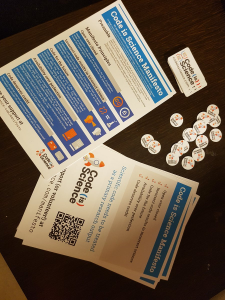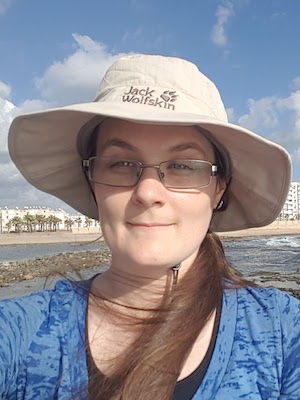Code is Science at GCCBOSC
Posted on 12 September 2018
Code is Science at GCCBOSC
 Image by Yo Yehudi
Image by Yo YehudiBy Yo Yehudi, University of Cambridge.
GCCBOSC this year was a combination of two open source bioinformatics conferences: GCC, the Galaxy Community Conference, and BOSC, the Bioinformatics Open Source Conference. Galaxy is a highly-successful bioinformatics workflow management tool, and BOSC is run by the Open Bioinformatics Foundation (OBF), an organisation dedicated to open-source biology and bioinformatics related software.
I was wearing several different hats at GCCBOSC – representing my day job at InterMine, an open-source biological data warehouse (I blogged about InterMine-related things here), I had recently joined the OBF board of directors and helped to run a Birds of Feather session for OBF community members, and also the focus of my blog today: I was really pleased to present a talk (and poster) for Code is Science, the project I’ve been focussing on during my Software Sustainability Institute Fellowship.
@yoyehudi discussing why isn’t scientific code always open and what can we do to change/fix this. Take a look at https://t.co/0NvjhvwBQm #GCCBOSC @codeisscience pic.twitter.com/Jasgo9hTNA
— Sehrish Kanwal (@skanwal23) June 28, 2018To give a bit of background, Code is Science is a project aimed at making more scientific code open source. At the Software Sustainability Institute Collaborations Workshop 2018 earlier this year, I co-wrote a manifesto with the help of Selina Aragon and Olexandr Konovalov, asserting that code is an essential part of science.
A shortened form of the manifesto principles are as follows:
Open over closed: Scientific code should be open when published, so it can be reviewed and re-used.
Incorrect code results in incorrect science: Reviewers should review code as well as the the subject matter.
Code for the future: Good coding practices make for better science!
Availability over perfection: It’s easy to be tempted to hide code until it’s “perfect” – share early.
Code deserves credit: software authors should gain credit for writing code and not just papers.
@codeisscience manifesto “open over closed”; “code for the future”; “incorrect code==incorrect science”; “availability over perfection”; “code deserves credit” @yoyehudi presenting amazing things #GCCBOSC
— Farah Z Khan ?✏️ ? (@farahzk03) June 28, 2018If these principles speak to you, you can read the full manifesto, and maybe even sign it yourself or encourage your organisation to sign it. If you’d like copies of the manifesto or stickers to distribute, feel free to contact us to request some.
Overall, my talk seemed to go well, if Twitter is any judge. I only had a seven-minute lightning talk slot, so I didn’t have quite enough time to give it as full a background as I’d have liked, nor cover future plans. Still, I was incredibly pleased to get the chance to share it at GCCBOSC, and I hope others feel similarly about scientific code.
Cool to see the @codeisscience manifesto presented by @yoyehudi. As we’ve always required all our published software papers to be available & #opensource it’s nice to see pushes for this to become the norm #GCCBOSC pic.twitter.com/QuoKmFfTXt
— GigaScience (@GigaScience) June 28, 2018Slides from the talk are available here and the poster is on GitHub. All materials are creative-commons licenced and can be freely re-used.

